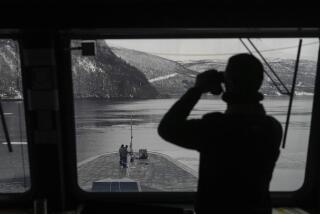Setting Aside Past, Poles Open Door to Germans
- Share via
SZCZECIN, Poland — Marian Jurczyk, the mayor of this Baltic coast city, believes in remembering the past--most definitely including the brutal Nazi occupation of Poland during World War II.
Yet as German military officers assigned to what will be the headquarters of a new corps of the North Atlantic Treaty Organization take up residence here for the first time since the war’s end in 1945, the 64-year-old mayor--like most Poles--is ready to look ahead.
“Nations that lose their memory lose their future. But we cannot live just thinking about the past,” Jurczyk said. “I think we should move away from the unpleasant things that took place in the past and build a peaceful road ahead of us.”
The Polish-German-Danish Multinational Corps Northeast is being located here, mainly with an eye toward building bridges between the nations involved rather than with any specific military mission in mind.
Most of the corps’ soldiers will remain based in their own countries, while Poland, Germany and Denmark will provide 108 officers and 49 lower-ranking military and civilian personnel to work here in this city of 420,000.
German and Danish troops will come to Poland on training exercises.
“From my point of view, the first idea of establishing such a corps is the question of multinationality,” said Maj. Gen. Hans-Joachim Sachau, a German officer who will be the unit’s chief of staff after the headquarters officially opens in June. “It’s not being involved in a crisis, but the enlargement of NATO. . . . It’s more or less integration of parts of Europe.”
Sachau said the biggest problem the unit faces is finding enough housing so that the families of officers will be able to move to Szczecin. This problem is particularly acute for the Germans because they will depend upon the general housing market, he said. The Danes plan to build their own housing.
If too many families choose to stay behind in Germany because of a housing shortage, that would thwart the broad socializing among Germans, Danes and Poles that is considered a key purpose of the base, Sachau said.
Despite the emphasis on friendship, both sides recognize that the return of German soldiers to Polish soil inevitably raises issues of public acceptance.
In a recent public opinion survey by a Polish polling organization, 67% of respondents supported NATO membership, 9% opposed it, and 24% said they were indifferent or gave no opinion. Yet some who support membership might prefer that it come without the stationing in Poland of foreign troops.
Lt. Col. Jochen Ewert, a German officer already working here to prepare for the opening of the headquarters, said that “it’s clear not 100% of Szczecinians love us.”
However, his contacts with the people of this city have been overwhelmingly positive, he said.
One explanation for the lack of hostility: Though the Polish army was compromised by its subservience to the Soviet Union during Communist rule and by its role in the martial law crackdown of the early 1980s, military men have been highly respected for centuries in Poland as symbols of the country’s struggle for existence.
Poland was wiped off the map of Europe from 1795 to 1807, from 1874 to 1918, and from 1939 to 1945. Yet the bravery of Polish soldiers, who often fought against enormous odds, left a stamp on popular attitudes that survives today--and paradoxically, that adds to the welcome given German officers such as Ewert.
“The Polish army was representing the freedom and independence of the Polish state,” Ewert explained. “The prestige of the army is very high. I am not used to this in Germany, but here everyone is very polite to me.”
More to Read
Sign up for Essential California
The most important California stories and recommendations in your inbox every morning.
You may occasionally receive promotional content from the Los Angeles Times.













